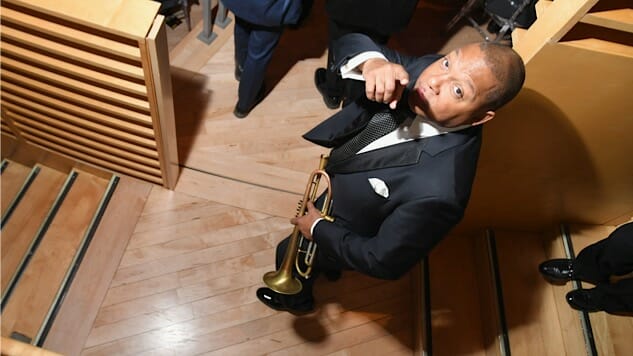Wynton Marsalis on Rap Culture: “You Can’t Have a Pipeline of Filth Be Your Default Position”
Hip-hop's impact on American culture, the trumpeter tells the Washington Post, is "more damaging than a statue of Robert E. Lee."
Photo: Getty Images Music News Wynton Marsalis
Pulitzer Prize-winning trumpeter Wynton Marsalis has never been a fan of hip-hop, something he’s made repeatedly clear in his three-decade career as America’s foremost spokesman for jazz culture. In an interview this week with the Washington Post, Marsalis weighed in on the current states of black culture, hip-hop and jazz, positing that rap music has had an overall negative impact on the country, and that recent events that have put the issue of race in the spotlight, including last year’s Neo-Nazi march in Charlottesville, Va., are less significant to the culture at large than what he calls the “pipeline of filth” produced by rap and hip-hop.
“You can’t have a pipeline of filth be your default position and not have it take a toll on society,” he told the Post’s Jonathan Capehart on an episode of Capehart’s podcast, Cape Up. “It’s just like the toll the minstrel show took on black folks and on white folks. Now, all this ‘nigger this,’ ‘bitch that,’ ‘ho that,’ that’s just a fact at this point. For me, it was not a default position in the ’80s. Now that it is the default position, how you like me now? You like what it’s yielding? Something is wrong with you; you need your head examined if you like this.”
Marsalis has long addressed racism and its deep roots in America culture in his music. In 1997, he became the first jazz musician to win the Pulitzer Prize for music with “Blood on the Fields,” a musical reflection on slavery. He’s also written pieces called “Black Codes (From the Underground),” which won two Grammys in 1986, and “From the Plantation to the Penitentiary.” He’s currently working on another examination of America’s struggle with racism, a commission titled “the ever-funky lowdown,” which homes in on negative perceptions of black culture that have been generated by mass white culture and, in some ways, parroted by black artists themselves. Jazz, Marsalis tells Capehart, is his way of addressing racial dynamics and progress at any given time in history.
“My words are not that powerful,” he said. “I started saying in 1985 I don’t think we should have a music talking about niggers and bitches and hoes. It had no impact. I’ve said it. I’ve repeated it. I still repeat it. To me that’s more damaging than a statue of Robert E. Lee.”
Asked about some of the most prominent voices in hip-hop today, Marsalis delivered a mixed assessment. He’s unimpressed with Kanye West and his recent foray into right-wing politics, dismissing West as little more than a salesman (“The quality of his thought is in the products he makes”), but more encouraged by Childish Gambino’s new political short film, “This Is America,” saying he applauds Donald Glover’s “creativity and what he’s doing.”
You can listen to the entire interview here.